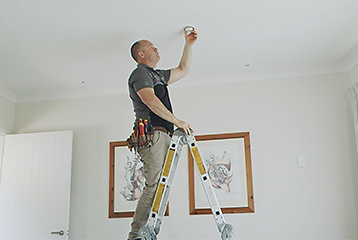If you’re planning to renovate your home, you might be wondering how much to outsource, and how much you can do yourself.
While a DIY approach will probably save you money, it may also take much longer and you might not get quite the same high-quality finish, although this depends on your skills and confidence levels.
Many people choose to use their DIY talents for the tasks they feel are within their experience and skill-set. If it’s been a while since you belted on a builder’s apron, the countless online guides and videos can help you brush up on the latest products and techniques. If you have plenty of time and are willing to re-do some work if necessary, you may even decide to extend your DIY skills into new areas.
Another way to save money during a renovation is to take on some of the routine house maintenance that you may hire someone else to do. Tasks like cleaning gutters, washing the house, cleaning windows and decks, painting, pruning trees and updating your garden only require time and effort. These are relatively straightforward jobs you could do yourself and put the money saved towards hiring experts for the more complex tasks.
Keep in mind that most professional tradespeople have the experience to ensure a result that functions well and looks great. For example, you may be up for laying some new tiles, but you may not know how to ensure a wall or floor is perfectly square and flat before you get started.
One way to decide whether to do a job yourself or leave it to the professionals is to consider your insurance coverage during and after your DIY work, and the consequences of getting it wrong. You don’t want to end up creating leaks or damaging electrical circuits that blow fuses or cause a fire that may not be covered by your insurance. Whereas a bad paint job can always be sanded back and done again.
Small jobs like painting the house, building a low deck or getting a plumber to replace an existing plumbing fixture won’t require a building consent. A lot of other work does though, so check with your local council before you begin.
A building consent lets you know that, provided you do what is described in the approved plans, your work will comply with the building code and therefore be safe and healthy.
Whoever issued your consent will inspect the work, sometimes at set stages as well as at the end. If the work is done according to the consent, they’ll give you a code compliance certificate. Having one of these is important, particularly when it’s time to sell your home.
Another way to save on renovation costs may be to manage the project yourself, taking on the jobs you can do well and hiring the necessary tradespeople as required. This approach requires sound project management skills and you’ll need to be a good communicator.
Many tradespeople work for a handful of property renovation and development companies, offering them lower rates and immediate service in return for the regular work. As a DIY project manager, you could end up paying slightly higher rates and having to wait until each contractor can fit you in. One thing to consider is if you book them too far in advance, you might find you’re not ready at the time you thought you would be and have to re-book and wait again.
Builders, tilers, glaziers, painters, plumbers and electricians often have to come in a particular sequence, sometimes returning several times. For example, an electrician may run wiring through wall framing then wait until the wall covering is up and painted before returning to install electrical fittings. The same can apply for a plumber. As a result, one delay can cause a complication of knock-on effects for everyone else. This is particularly true for bathroom and kitchen renovations, where it’s sometimes more cost effective to hire a company that takes care of everything for you. That can also mean you’re living without a kitchen or bathroom for a much shorter time while the work is done.
There are, however, many home improvement projects where you can save a lot of money by taking your time and managing things yourself. It’s usually just a matter of how complex the project is, how much time you can dedicate to it and how fast you want everything done.
There is a growing trend where people buy their own materials, fittings and/or appliances, and hire professionals to do all the work. You may be able to make savings if you wait and shop for bargains, rather than relying on a professional’s existing supplier.
For example, you might find a great price on a small amount of end-of-run tiles that has enough to cover your area plus extras for cutting and breakages. Retailer sales on cabinets, fittings and appliances that are about to be replaced by new models are another great source of savings for ‘buy-it-yourself’ renovators.
You just need a plan to identify and buy things that will fit your spaces, and the time to hunt down the bargains. If you’re buying more than one appliance, be sure to let retailers know. Ask about access to trade prices even if the items are already on special and tell them you’re shopping around for the best deals.
AMI Home Insurance covers your home against the unexpected. From flood damage after a storm, to temporary accommodation costs if your home becomes unliveable after an event, to the repair or rebuild costs if your home’s destroyed by fire, we're on your side.
For more information about how your home is covered with us, read the policy wording. You can get a quote online, call us on 0800 100 200, or chat to us on Facebook - we’re here to help.


